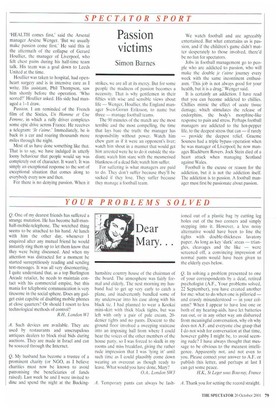Passion victims
Simon Barnes
'HEALTH comes first,' said the Arsenal manager Arsene Wenger. 'But we usually make passion come first.' He said this in the aftermath of the collapse of Gerard Houllier, the manager of Liverpool, who felt chest pains during his half-time team talk. His team was a goal down to Leeds United at the time.
Houllier was taken to hospital, had openheart surgery and is in intensive care as I write. His assistant, Phil Thompson, saw him shortly before the operation. 'Who scored?' Houllier asked. His side had managed a 1-1 draw.
Passion. I am reminded of the French film of the Sixties, Un Homme et Une Femme, in which a rally driver completes some epic drive across France. He receives a telegram: `.1e t'aime.' Immediately, he is back in a car and roaring thousands more miles through the night.
Most of us have done something like that. That is to say, we have indulged in utterly loony behaviour that people would say was completely out of character. It wasn't. It was simply an exceptional response to the sort of exceptional situation that comes along to everybody every now and then.
For there is no denying passion. When it strikes, we are all at its mercy. But for some people the madness of passion becomes a necessity. That is why gentlemen in their fifties with wise and sensible views about life — Wenger, Houllier, the England manager Sven-Goran Eriksson, to name but three — manage football teams.
The 90 minutes of the match are the most terrible and the most compelling, the time that lays bare the truth: the manager has responsibility without power. Watch him chew gum as if it were an opponent's liver; watch him shout in a manner that would get him arrested were he to do it outside the stadium; watch him stare with the mesmerised blankness of a dead fish; watch him suffer.
For suffering is what managers are paid to do. They don't suffer because they'll be sacked if they lose. They suffer because they manage a football team. We watch football and are agreeably entertained. But what entertains us is passion, and if the children's game didn't matter desperately to those involved, there'd be no fun for spectators.
Jobs in football management go to people who are addicted to passion, who will make the double je t'aime journey every week with the same incontinent enthusiasm. 'This job is not always good for your health, but it is a drug,' Wenger said.
It is certainly an addiction. I have read that you can become addicted to chillies. Chillies mimic the effect of acute tissue damage, which stimulates the release of endorphins, the body's morphine-like response to pain and stress. Perhaps football managers are addicted to the hot-pepper life, to the deepest stress that can — if rarely — provide the deepest relief. Graeme Souness had a triple bypass operation when he was manager of Liverpool; he now manages Blackburn Rovers. Jock Stein died of a heart attack when managing Scotland against Wales.
Football is the excuse or reason for the addiction, but it is not the addiction itself. The addiction is to passion. A football manager must first be passionate about passion.


























































































 Previous page
Previous page